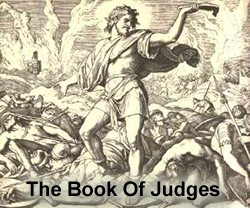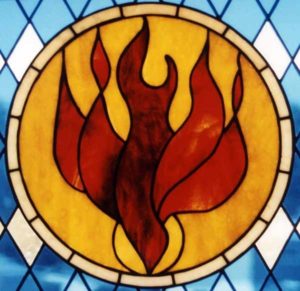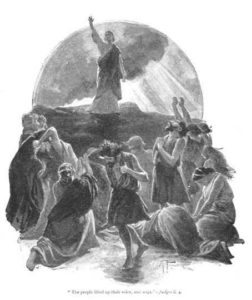 In the Book of Judges, we have the record of approximately 350 years of Israel’s history after the death of Joshua. There are seven cycles of spiritual declension and deliverance. About 100 of those 350 years are “mini-dark ages” in which the people turn away from God to serve their preferred idols.
In the Book of Judges, we have the record of approximately 350 years of Israel’s history after the death of Joshua. There are seven cycles of spiritual declension and deliverance. About 100 of those 350 years are “mini-dark ages” in which the people turn away from God to serve their preferred idols.
The Hebrew title of the Book is “Shophetim,” meaning “judges,” “rulers,” “deliverers,” or “saviors.” Some are “warrior-rulers” (Othniel and Gideon), one is a priest (Eli, in the Book of 1 Samuel), and some are prophets (Samuel and Deborah). These various offices point to the Messiah.
The Book demonstrates the need for a righteous savior to provide deliverance and put us in a right relationship with God.
The Book records 7 apostasies, 7 servitudes, 7 heathen nations, and 7 deliverances.
 The verse that describes the period historically and spiritually is:
The verse that describes the period historically and spiritually is:
“In those days there was no king in Israel; every man did what was right in his own eyes.” (Judges 17:6; also 21:25)
This book, like the Book of Ruth that follows it, was written many years after the events occurred, when Israel had satisfied its own desires to have a king like other nations (Judges 17:6;18:1; 19:1; 21:25; Ruth 4:17,22).
Our contemporary culture of relativism is well reflected in the words, “every man did what was right in his own eyes.”
The Holy Spirit inspires the historical record of this period in such a way as to provide warning and instruction for us today.
“All Scripture is inspired by God and profitable for teaching, for reproof, for correction, for training in righteousness; [17] so that the man of God may be adequate, equipped for every good work.” (2 Tim. 3:16-17)
 We read about the Holy Spirit coming upon certain individuals: Othniel (3:10), Gideon (6:34), Jephthah (11:29), and Samson (13:25) to help them accomplish God’s purposes.
We read about the Holy Spirit coming upon certain individuals: Othniel (3:10), Gideon (6:34), Jephthah (11:29), and Samson (13:25) to help them accomplish God’s purposes.
The Bible is the story of the return of the King. We were created by God to be governed by Him (in the kingdom of God). There can be no kingdom without an enthroned king. In the first century A.D., when the apostles preached about the kingdom of God they were announcing that Israel’s true King had come, Jesus of Nazareth. However, rather than receiving Christ as King, many despised and rejected Him. He came unto His own, but (as a whole) His own received Him not (John 1:11).
King David was anointed as king by the prophet Samuel, while another king, King Saul, was on the throne. King Saul represents the natural man and the natural choice of man. When the greater David, Jesus of Nazareth, the prophesied Son of David, was announced as Christ the King, the rule of the natural man (the kingdom of self) stood in the way. Therefore, the gospel of the kingdom is a call to repentance of sin (self-rule with its ways of self-redemption) which involves turning to the Living God through faith in the person and work of His Son, Jesus Christ.
Joshua failed to disciple a successor. He did manage to challenge his generation to leave their preferred idols for a season (either the idols of the previous generations in the wilderness and Egypt or the idols of the Amorites and Canaanites) and join him in serving the Living God (Joshua 24:14-15). However, when Joshua died at the age of 110, enemy strongholds remained in the promised land.
Israel had been warned of the spiritual and moral compromise that would occur if they failed to obey their marching orders to fully drive out the enemy.
This is a reminder that each one of us must pursue the process of sanctification (1 Thess 4:3, Heb 12:14; 2 Cor 7:1; Eph. 4:24; 1 Tim 2:2). It is the will of God that we pursue holiness in every area of our lives with uncompromising obedience to the Captain of our salvation (Joshua 5:14), the overseer of our souls (1 Peter 2:25).
1 Thess. 5:23 Now may the God of peace Himself sanctify you entirely; and may your spirit and soul and body be preserved complete, without blame at the coming of our Lord Jesus Christ.
A doctor can prescribe medicine for you to take for your illness, but if you do not take it, you are a “hearer of the word” but not “a doer” (James 1:23). The process of spiritual decline begins when we are “hearers only.” We may be practicing a form of godliness but be denying the power that makes obedience unto godliness possible (See 2 Timothy 3:5).
As in the previous six books of the Old Testament, we are reminded that in spite of the frailty and disobedience of human instruments, God persists in advancing His purpose. After the death of Moses, the plan for Israel to receive their inheritance in the Promised Land was not abandoned. Joshua pursued these God-given objectives. Now Joshua had died, and although there were many failures, God was not hindered from moving forward towards His stated objectives, which would be fulfilled in Christ. Although His people experience defeat, He will not be defeated, and His purposes will not be thwarted.
In the first chapter of the Book of Judges, we have the recorded failure of the tribes to drive out the enemy and possess the land.
Judah is victorious at first. This tribe is the first to take the challenge to go up and fight. Judah’s successes are recorded in verses 2 to 18. The city of Bezek is taken, and the Canaanites are defeated at Jerusalem, though not driven out. The tribe of Judah is successful in defeating Zephath (Hormah), Gaz, Eskelon, and Ekron.
 Then we come to the word “but.” It is a word that is used often in this chapter to point out Israel’s failure to do what they were told.
Then we come to the word “but.” It is a word that is used often in this chapter to point out Israel’s failure to do what they were told.
Now the Lord was with Judah, and they took possession of the hill country; BUT they could not drive out the inhabitants of the valley because they had iron chariots. (Judges 1:19)
A similar thing is said of the tribe of Benjamin.
BUT the sons of Benjamin did not drive out the Jebusites who lived in Jerusalem; so the Jebusites have lived with the sons of Benjamin in Jerusalem to this day. (Judges 1:21)
The house of Joseph (the tribes of Ephraim and Manasseh) also compromise with the enemy. They went up against the city which was originally named ‘Luz’ (now known as ‘Bethel’). Instead of fully driving out the inhabitants, spies from the house of Joseph negotiate with a man and his family permitting them to go free if they would provide needed information about gaining entrance to the city for their planned attack. The man and his family go free, only to build another fortified city of resistance and naming the city after the one that the Israelites had been told to conquer. They named the city ‘Luz’ (1:22-26). So, in principle, the city they thought they conquered reappeared, and the writer notes that it remains to this day.
There is a powerful application here. If we don’t thoroughly deal with those forces that war against our soul (the world system, the flesh, and the devil), their corrupting influences will reappear and threaten to remain.
Judges Chapter 1 continues to list the failures of the tribe of Manasseh (v.27); Ephraim (v. 29); Zebulun (v.30); Asher (v. 31); and Naphtali (v.33). The tribe of Dan was constricted (hindered) by the Amorites. In the New Testament, we see that Satan is a hinderer and will do what he can to hold us back from fulfilling our God-given mission (1 Thess 2:18).
We have a summary statement in verse 28: “They did not drive them out completely.”
Judges 1:28 It came about when Israel became strong, that they put the Canaanites to forced labor, but they did not drive them out completely.
Because the writer had the advantage of hindsight, he was able to reflect upon these events and identify the 7 cycles of apostasy, in which the people of God turn away from Him, call out to Him for a deliverer, and then receive the deliverer whom He raises up to restore their peace.
THE LORD’S REBUKE
 The writer is able to see the continuity of God’s purpose. The commander in chief remains, the angel of the Lord, the captain of the Lord’s host whom we met in Joshua 5:13. The angel is a Christophany- a pre-incarnate appearance of the second person of the Trinity. He claims to be the one who brought them out of Egypt and into the Promised Land. He rebukes the Israelites for making covenants with the enemy and not tearing down false altars. He rebukes them with these words:
The writer is able to see the continuity of God’s purpose. The commander in chief remains, the angel of the Lord, the captain of the Lord’s host whom we met in Joshua 5:13. The angel is a Christophany- a pre-incarnate appearance of the second person of the Trinity. He claims to be the one who brought them out of Egypt and into the Promised Land. He rebukes the Israelites for making covenants with the enemy and not tearing down false altars. He rebukes them with these words:
Judges 2:3 “Therefore I also said, ‘I will not drive them out before you; but they will become as thorns in your sides and their gods will be a snare to you.’ ”
The rest is history. They name the place where the angel announces this bad news “Bochim,” which means “weeping.”
How is it possible that the people of God who had been delivered and provided for by the good hand of God should turn again to Baal worship? (2:11-12)
NEW TESTAMENT READING — Luke 21:29-22:13;
We can bank on the words of the Lord Jesus Christ coming to pass and yet never passing away.
Luke 21:33 (NASB) 33 “Heaven and earth will pass away, but My words will not pass away.”
The worries of this life, wasteful and self-indulged living, will blind us to the fact that there is a Day of Judgment coming.
Just as spring is followed by summer, Jesus assures us that the kingdom of God will come. Jesus’ predictions have come true and will come true.
Jesus taught daily at the temple and then retreated at night to camp on the Mount of Olives. This is where one day in the future, He will make His arrival as the King of Kings. Let us fix our eyes on the reality of this future kingdom and pray, “Thy kingdom come, Thy will be done!”
While the crowds gathered in the temple to hear Jesus expound the Word of God, the so-called Jewish teachers were delighting in the possibility of Him being betrayed into their hands by Judas.
Jesus spoke of the imminent Passover meal with authority. He told his disciples to prepare the meal at a place already prepared. They would be guided to this secret location by a man carrying a pitcher of water.
Disciples can take assurance from this event.
Luke 22:13 (NASB) 13 And they left and found everything just as He had told them;
TODAY’S PSALM: Psalm 90-91:16;
Psalm 90:12 (NASB) 12 So teach us to number our days, that we may present to You a heart of wisdom.
Life is short. We soon will be standing before the Lord. Let us live accordingly.
A good prayer for today:
Psalm 90:16-17 (NASB) 16 Let Your work appear to Your servants And Your majesty to their children. 17 Let the favor of the Lord our God be upon us; And confirm for us the work of our hands; Yes, confirm the work of our hands.
May your Spirit-wrought efforts be successful!
Psalm 91 is a great psalm of protection.
Do you recognize the Lord as your protector? Verses 9 and 10 emphasize that we must choose to abide in Him.
Psalm 91:9-10 (NASB) 9 For you have made the LORD, my refuge, Even the Most High, your dwelling place. 10 No evil will befall you, Nor will any plague come near your tent.
How are we to interpret these words? We must remember that they are given in the context of the Mosaic covenant of blessings and curses to those living under the Law. The Psalms are part of the Hebrew hymn book. All of the Bible is written for us, but not all of the Bible is written to us.
John Phillips in his book, “Exploring Psalms” sums up the distinction well:
“We need always to remember when interpreting these wonderful psalms that they are part of the Hebrew hymnbook. These are not gospel songs, written for those who have put their trust in Christ since Calvary. They are old Hebrew hymns and belong primarily and essentially to the nation of Israel. We need to exercise spiritual discernment before claiming such promises as blanket guarantees of well-being today. The Old Testament blessing for Israel included national prosperity and divine protection. So long as Israel walked in step with God there was not a nation that could defeat her in battle or successfully invade her land. The godly Jew could legitimately claim the promises of Psalm 91 in an hour of danger and could expect that, although people fell all around by the thousands, neither the flying arrow nor the sinister pestilence would come near him.”
“But we are not Old Testament Hebrews. We are New Testament Christians. For us God’s blessings are essentially spiritual rather than national and temporal. We have no unconditional guarantee from God, that as we live godly lives, we shall escape the ordinary terrors of life.”
Certainly, we see this as true today, as many godly followers of Christ are experiencing the terror and atrocities of war, the brutality of abduction, imprisonment, disease, and death. We face hardships and persecution and cannot claim immunity.
John Philips writes, “As a boy, with the other children in school, I was issued a gas mask, just like everyone else at the beginning of World War II. My father taped up all our windows as protection from flying glass, should the bombs fall on our street. One did within fifty yards of our house. We had an air-raid shelter in our garden, and many a night we cowered there as searchlights probed the night sky, bombs came screaming down, and shrapnel from antiaircraft guns fell like rain. We had no immunity from the perils of war just because we were Christians. We lost loved ones and Christian friends.” What we are given in this Psalm is a reflection of God’s steadfast love towards His children.
The New Testament Book of Romans explains:
“Who will separate us from the love of Christ? Will tribulation, or distress, or persecution, or famine, or nakedness, or peril, or sword? Just as it is written, “FOR YOUR SAKE WE ARE BEING PUT TO DEATH ALL DAY LONG; WE WERE CONSIDERED AS SHEEP TO BE SLAUGHTERED.” But in all these things we overwhelmingly conquer through Him who loved us. For I am convinced that neither death, nor life, nor angels, nor principalities, nor things present, nor things to come, nor powers, nor height, nor depth, nor any other created thing, will be able to separate us from the love of God, which is in Christ Jesus our Lord.” (Romans 8:35-39)
PROVERB FOR TODAY:
Proverbs 13:24-25 (ESV) 24 Whoever spares the rod hates his son, but he who loves him is diligent to discipline him. 25 The righteous has enough to satisfy his appetite, but the belly of the wicked suffers want.
True love must dare to discipline. This proverb does not advocate physical abuse. The rod of parental authority is to represent the authority of God. Those who do not correct the foolish, the disobedient, the disrespectful, and rebellious behavior of their children do not really love them.
PRAYER: Father, You are faithful who have called us to sanctification, and You will do it as we cooperate with Your grace. Help us to fulfill the objectives You have for our lives, that we may know, revere, and obey Your Word and know, revere, and obey Your Son, by the power of Your Spirit. We ask this, in Jesus’ Name. Amen.
Pastor David
